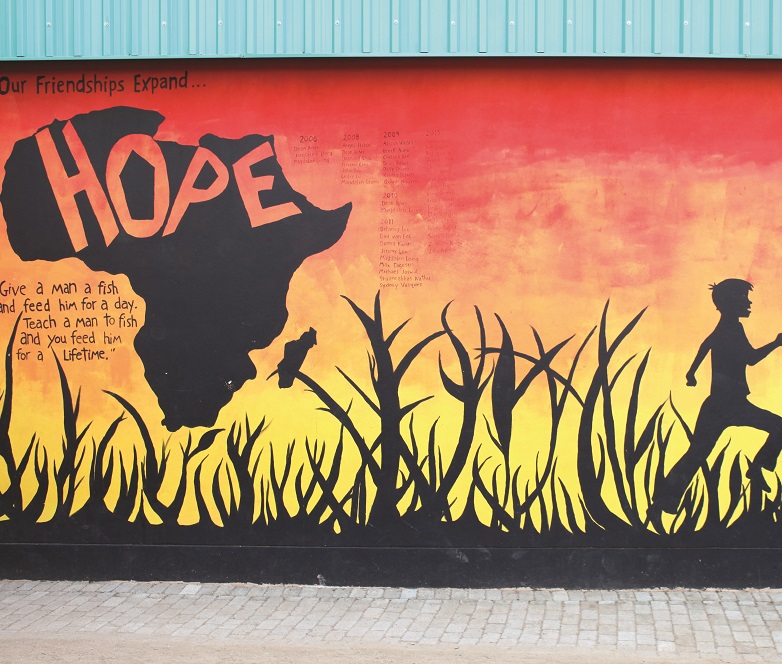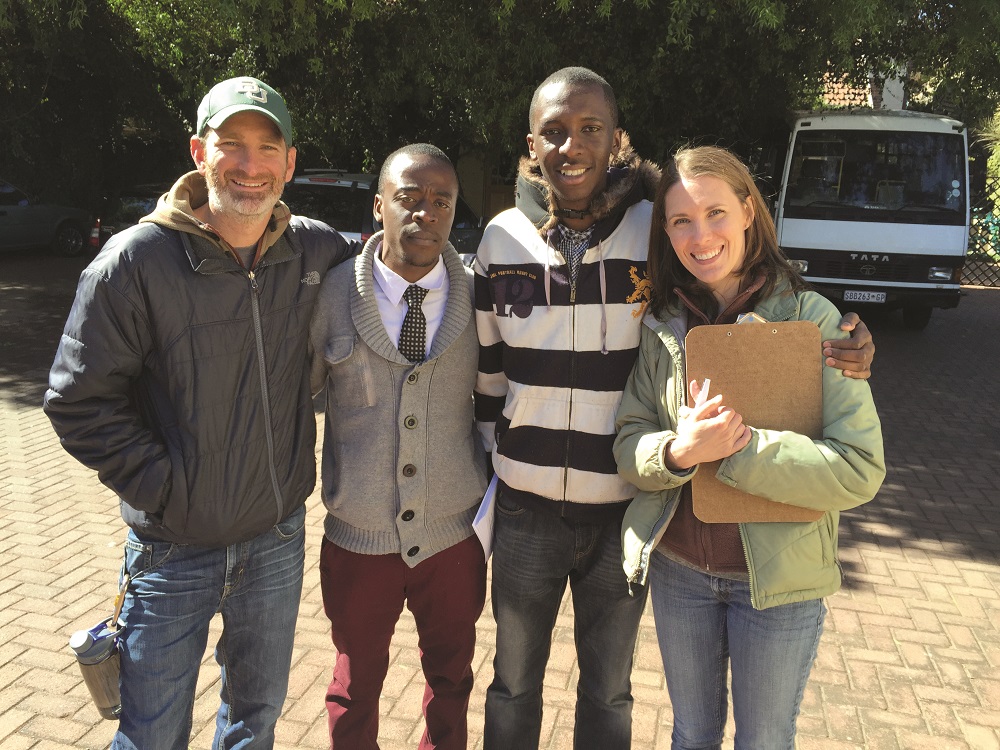By Aaron Weaver
In the sixteenth chapter of Genesis, God promises the weary and desperate Hagar a future for her unborn son, Ishmael, offering the Egyptian maidservant hope and strength as she wanders through the burning Judean desert. Stopped at a spring, she calls out to God with the name “El Roi” — Hebrew for “the God who sees me.”
“You are the God who sees me,” Hagar said. “I have now seen the One who sees me.”
Each year, more than 3,500 newborn babies are abandoned across South Africa, and in the country’s largest city of Johannesburg 200 babies are abandoned monthly — many conceived through violence or born with HIV and most discovered already dead.
The Refilwe Community Project, a Christian ministry serving the Lanseria area of Johannesburg, describes God as a God who sees all. God is a God who watches over all, especially babies abandoned on the side of a street, at a park, in shoe boxes and trash bins and wrapped in plastic bags dumped in gutters and latrines.

Three years ago, the El Roi Baby Home opened its doors at Refilwe to provide a safe home for the abandoned babies of Johannesburg. Since then, El Roi has been a home for 28 babies — 13 of which have been placed with their “forever family” through adoption.
A small staff of local women known as “aunties” work around the clock to care for and bond with the infants, focusing on sleep training and establishing a strict daily schedule to ensure a consistent routine and create healthy boundaries. Daily occupational therapy exercises help the babies of El Roi meet their developmental goals, and a group of local and international pastors regularly pray for the babies and oversee dedication services.
In 2014, El Roi installed a “Baby Safe” outside of its facilities, where a mother can safely and anonymously leave her baby. When a baby is placed in the covered metal box, weighted sensors trigger an alarm that notifies an auntie who quickly retrieves the baby.
“We want to be a part of God’s plan to rescue these babies by offering the Baby Safe for people to anonymously abandon their child if they feel that’s their option,” said Nicole Gillette, who has managed the El Roi Baby Home since it opened in October 2012.
‘They won’t remember my voice’
Showing and sharing God’s love with the babies is the raison d’etre for Gillette and her team of aunties.
“We try to capitalize on the time that the babies are with us by helping them understand that they’re wanted and that they’re loved and that God has a plan for their lives,” Gillette said. “Even if their mother and father abandoned them, God will never forsake them. It’s really important for our babies to feel that love and to know that love.
“I know that my babies won’t remember me. They won’t remember my voice. They won’t remember my touch. But I’m convinced that they will remember the love of Christ that came through me,” Gillette said. “And on that day when they hear about the love of Christ again, be it at Sunday school or sitting on a bus when they’re 50 years old, something in their heart is going to go, ‘I’ve known this love before.’ And that’s what we try to do. We try to love these babies with the love of Christ.”
The idea for the El Roi Baby Home was born during a summit of congregational ministry partners at Second Baptist Church in Little Rock, Ark. There, Refilwe’s then-director Jaco Van Schalkwyk was introduced to Cheryl Allen, founder of Door of Hope Children’s Mission — a Johannesburg-based ministry located just 25 miles away from the Refilwe campus that rescues and receives abandoned, abused and orphaned babies, providing them with a temporary Christian home while seeking a forever family.
During the summit, Allen encouraged Schalkwyk to examine the possibility of starting a baby home, offering to assist Refilwe through all the government paperwork and processes alongside Caroline Smith, one of the Cooperative Baptist Fellowship’s field personnel serving at Refilwe. When El Roi was ready to open, Allen sent Gillette, her trusted aide and long-time volunteer at Door of Hope, to Refilwe to manage the baby home.
Since its birthing in 1999 out of Berea Baptist Church in Johannesburg, where Allen served as senior pastor (one of the few female Baptist pastors in all of Africa), Door of Hope has saved more than 1,500 babies and is almost always at capacity with 60 babies at its three baby houses. Roughly 10 percent of the rescued babies are left in the ministry’s well-known ‘Baby Bin’ located steps away from a corner stand selling cokes, cigarettes and cell phone minutes in a high-crime downtown neighborhood where being robbed even during Sunday worship is not an impossibility.
Discovering the way
For a week in July, the South Africa Ministry Network, a consortium of Cooperative Baptist Fellowship congregations launched in 2009 to work with and support CBF field personnel in the country, led a group of just over 70 Baptists to take part in a short-term mission experience in Johannesburg as well as at mission sites 250 miles southeast in the rural Winterton area of the KwaZulu-Natal province.
The hands-on trip culminated with the group taking part in the 21st Baptist World Congress in Durban, South Africa, the quinquennial global gathering of the Baptist World Alliance
Seven network congregations, in addition to Second Baptist in Little Rock, participated in the mission experience: Broadway Baptist Church, Fort Worth, Texas; Gaston Oaks Baptist Church, Dallas; First Baptist Church, Knoxville, Tenn.; First Baptist Church, Wilmington, N.C.; Second Baptist Church, Memphis, Tenn.; and First Baptist Church, Chattanooga, Tenn.
Around 30 participants volunteered with Door of Hope and Berea Baptist Church and also at Refilwe, where CBF field personnel Caroline and Josh Smith served from 2011-2014. At Refilwe, the small group spent their week working with neighborhood children at a kids club and after-school program as well as at the El Roi Baby Home.
There was manual labor too as some volunteers sanded and stained a playground set for the 30-plus children of Refilwe’s God Parent Programme, a family-based foster care model that provides a safe and stable home environment for children.
Other participants went on home visits with Sister Didi Mojapelo, a South African nurse who came out of retirement several years ago to open the Bophelo Medical Clinic at Refilwe, which provides much-needed health care to more than 350 people each month in the surrounding community as well as food parcels to vulnerable senior adults.

“We discovered the ways that the Refilwe Community Project uses staff and volunteers to be the presence of Christ among foster children, families from a nearby informal settlement, and many others,” said Melody Maxwell, a professor at Howard Payne University in Brownwood, Texas, who led her international missions practicum class on the trip alongside the network’s churches.
“We did not carry the burden of introducing God to South Africa, since God has already been at work there,” Maxwell said. “Instead, we had the privilege of identifying and joining God in God’s ongoing work there. We sought to be presence of Christ in tangible ways that might draw ourselves and others closer to God.”
Babies made in image of God
God was clearly at work through the ministry of Refilwe, added Derek Hatch, who teaches Christian Studies alongside Maxwell at Howard Payne.
“I saw God at work in the amazing love shared among the people we encountered. Regardless of social location or income level or ethnic background, Christ’s cosmic love was made manifest in people who met us, worked with us and received us.”
Charlie Fuller, minister for congregational life at Second Baptist, Little Rock, said the mission experience helped to “reframe the gospel” for him in a new and powerful way.
“I was moved by the genuine faith of the people with whom we worked. Facing what many of us here would consider intractable problems, they faithfully day-by-day engage with those who have so very little in terms of food, clothing and shelter.”
Brannon Hulsey, a layperson from network member First Baptist Church of Knoxville, Tenn., spent her time caring for the children of Door of Hope and chatting with the aunties.
“These women truly believe that all babies are made in the image of God, that all babies should be cared for and loved,” Hulsey said. “What an excellent testimony of their faith to dedicate their lives to raising up children of God who otherwise would be left to die.”
Over the past six years, the South Africa Ministry Network has made significant investments in the ministry at Refilwe, including providing financial support for CBF field personnel and long-term volunteers from network congregations as well as for the construction of an onsite volunteer housing block, which has become a source of income for their South African partner. The network has also purchased a truck for Sister Didi, funded the salaries of caregivers at the medical clinic and completed multiple construction projects on the Refilwe campus.
‘You are the God who sees me’
Since 2012, network member Broadway Baptist Church has supported Refilwe’s preschool, which serves nearly 80 four-to-six year old children, and made possible a weekly community-wide Agape Meal, modeled after the historic congregation’s popular 20-year-running weekly banquet dinner that feeds 170-180 low-income and homeless individuals each week.
“For me, if I should think of the biggest gifts that CBF has given us, it’s the volunteers,” said Lelanè Brits, Refilwe’s chief operation officer. “Thank you for your investment into Refilwe. Thank you for your faith in us. Thank you for sticking it out, coming back every time.”
Breaking the cycle of poverty — the vision of the Refilwe Community Project — is no easy task. It’s not a transactional task, but a transformational one that requires partnerships.
“It’s so important to move from a transactional organization to a transformational organization,” Brits said. “It’s so easy to be transactional, to say ‘I will feed you, I will give you a bed.’
But it means much more than that.
“Transformational is when you really make a difference and you really address the reason why we are here. If we’re really transformational, we need to change the vulnerability of the children of this community,” Brits said.
As the Refilwe Community Project lives into its vision and seeks to be a transformational organization, it does so alongside the South Africa Ministry Network, sharing the conviction that God is El Roi.
“You are the God who sees me. I have now seen the One who sees me,” Brits said.
